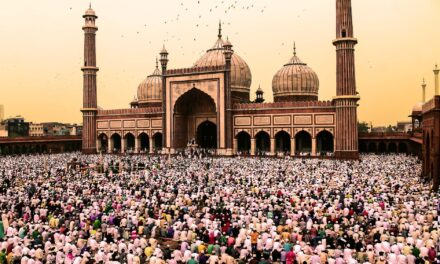Just as the wahy was conveyed by different methods (direct and indirect) and forms (visions and speech), there were variations in the types of Wahy ( revelation) which were conveyed: the Qur’aan, hadeeth qudsee, and hadeeths of the Prophet (ﷺ).
Wahy in the form of the Qur’aan is defined as Allaah’s word revealed to Prophet Muhammad (ﷺ) in Arabic, whose style and construction is miraculously inimitable and whose recitation is a form of worship. On the other hand, wahy in the form of hadeeth qudsee is defined simply as Allaah’s word revealed in Arabic to Prophet Muhammad (ﷺ). Such hadeeths are those in which the Prophet (ﷺ) attributes statements directly to Allaah, saying, for example, “ Allaah said…” or “ Your Lord said….” or the sahabee says, “The Prophet (ﷺ) reported from his Lord…”
As for the hadeeths of the Prophet (ﷺ), they can be divided into two main categories. The first consists of statements of the Prophet (ﷺ) based on his own reasoning (ijtihaad). Such statements are not considered to be wahy. However, even this category is indirectly connected with wahy, because his statements were either corrected by revelation if incorrect, or approved by the absence of revelation if correct. The second category is prophetic statements whose meanings were revealed (wahy), but whose expressions were in the Prophet’s own words. This is the only part of the hadeeths of the Prophet (ﷺ) that can rightly be considered wahy.
DOUBTS ABOUT QUR’AANIC WAHY
Attempts to create doubts about the authenticity of the Qur’aan have been made from the time of the Prophet (ﷺ) until today. Hence, a study of wahy would be incomplete without a look at the doubts which have been raised, as well as the replies which have been given to them.
The following objections to the divine origin of the Qur’aan are the two most commonly raised:
(1) The Qur’aan was the product of Muhammad’s intelligence. (2) Muhammad (ﷺ) was taught the stories of the Qur’aan by someone else.
Some critics claim that the meanings of the Qur’aan were made up by the Prophet (ﷺ), and its unique style devised by him. If such a claim were true, it would mean that the Prophet’s claim that the Qur’aan was revealed was false. That is, the Prophet (ﷺ) either knowingly or unknowingly deceived his followers. The kinder critics claim that the Prophet (ﷺ) was well-intentioned, as his biography has proven him to be, but the “revelations” were really delusions and hallucinations which afflicted him from time to time. This claim is totally unsubstantiated historically, and the clarity and coherence of the Qur’aan could not have been the result of a madman’s ramblings.
The less kind critics claim that the Prophet (ﷺ) deceived his followers in order to firmly establish his leadership over them and eventually over the whole of Arabia. However, if the Prophet’s goal had been personal glory and leadership, it would have been more to his advantage to claim the Qur’aan for himself, since his enemies among the pagan Makkans had all conceded its superiority over all other literary works and had offered the Prophet (ﷺ) the position of kingship over Makkah if he would only stop preaching the unity of God.
Other critics of the Qur’aan’s divine origins claim that the Prophet (ﷺ) attributed it to Allaah in order to give more weight to his words in the minds of people and increase their obedience to him. But if that were the case, he would not have bothered to attribute any of his statements to himself. In fact, his attribution of statements to himself has not in any way affected the obligation of his followers to obey him.
Criticisms such as those previously mentioned would put the Prophet (ﷺ) among worldly leaders who deceive their followers in order to achieve power, prestige, and the luxuries of this life. However, the Prophet’s biography, which has been recorded in the minutest of details, proves the exact opposite. Instead of deception and corruption, we find the Prophet (ﷺ) known for his truthfulness and generosity, so much so that he was named “ al-Ameen” (the Trustworthy). He lived very simply, and we find that he died without leaving any wealth or debts behind him.
It should also be noted that there are many instances in the Qur’aan where the Prophet’s mistakes were openly corrected. For example, when the Prophet (ﷺ) accepted ransom for the prisoners of Badr, the following verse was revealed:
“It is not fitting for a prophet to take prisoners until he has established himself in the land (by overcoming the enemy in war). You all desire the fleeting gains of this world while Allaah wishes (for you the fruit of) the next world. And Allaah is Powerful and Wise. Had it not been for a previous decree by Allaah, you all would have been struck with a severe punishment.”
Another example is when the Prophet (ﷺ) brushed aside ‘Abdullaah ibn Umm Maktoom, who had asked that he be taught the Qur’aan. The Prophet (ﷺ) had been earnestly engaged with a group of Qurayshee leaders whom he was calling to Islaam. Allaah revealed the following verses:
“He frowned and turned away because the blind man came to him. Yet for all you knew he might have grown in purity or been reminded and benefited from the reminder. As for him who regards himself as self-sufficient, you attend to him, though you are not to blame if he does not become purified.”
For the Prophet (ﷺ) to expose such minor errors which were imperceptible to those around him was certainly not to his advantage if his goals were power and prestige.
Other critics have claimed that the Prophet (ﷺ) learned the knowledge contained in the Qur’aan from Christian or Jewish sources. There is a report, about whose authenticity the scholars of hadeeth are divided, that the Prophet (ﷺ), while still a boy, travelled to Syria with his uncle and guardian Aboo Taalib, and on the way met a Christian monk, Buhayraa. There is no dispute that after the beginning of revelation, Prophet Muhammad (ﷺ) was introduced by his wife Khadeejah to her cousin Waraqah ibn Nawfal, who was known to have knowledge of the Torah and Gospels. The Prophet (ﷺ) is also known to have met Jewish and Christian scholars after his migration from Makkah to Madeenah.
However, his meeting with the monk was short, and all that transpired was the monk’s prophecy to the Prophet’s uncle Aboo Taalib of his nephew’s impending prophethood. As for Waraqah ibn Nawfal, he only confirmed that what was revealed to the Prophet (ﷺ) came from the same source as the revelations of the stories that do not occur in the Torah or Gospels, or which contradict them, have earlier prophets. There is no record of the Prophet (ﷺ) having studied with him, and Waraqah died shortly after this incident. In Madeenah, the Christians and the Jews used to debate with the Prophet (ﷺ) and ask him questions; many of the Madeenan verses answered their questions. They would ask him questions in order to disprove his prophethood, and he would answer with the Qur’aan.
There is no historical record of anyone having taught the Prophet (ﷺ). Some, however, claim that Haddaad, the Roman, was his teacher, but such a claim is quite erroneous, because the Makkans did not consider Haddaad knowledgeable, nor was he free to teach. He was known to be fully occupied as a blacksmith, and it was known that he was a foreigner who could barely speak Arabic.The Arabs of the Prophet’s time were very anxious to discredit the Qur’aan, but they were unable to do so. If there had been a secret teacher, he would surely have been exposed at that time.
Recently, most of the Qur’aanic been traced to apocryphal books of the Christians and Jews. This has been cited as proof that the Prophet (ﷺ) studied the books of the Christians and the Jews. However, the number of obscure books to which the Qur’aanic stories have been traced is great, and the languages of these books vary between Amharic, Syriac, Hebrew and Greek. Consequently, the Prophet (ﷺ), who could not read or write, would have had to spend most of his time studying foreign languages, searching all over the Middle East for the books and studying them in depth. Thus, even the most recent of critical research only further confirms the divine origin of the Qur’aan.
You can buy the finest cashews from www.kashmirica.com
Also Read:
Should a Muslim Follow a Madhab?




![What is Usool at Tafseer? [Principles of Tafseer]](https://sunnahinsights.com/wp-content/uploads/2021/05/pexels-photo-5531014-440x264.jpeg)


Recent Comments